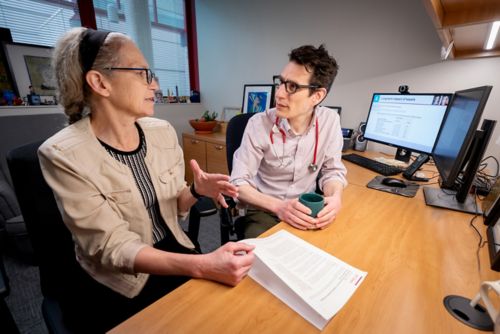St. Jude Family of Websites
Explore our cutting edge research, world-class patient care, career opportunities and more.
St. Jude Children's Research Hospital Home

- Fundraising
St. Jude Family of Websites
Explore our cutting edge research, world-class patient care, career opportunities and more.
St. Jude Children's Research Hospital Home

- Fundraising
Preventing sepsis during treatment for pediatric cancer might prevent neurocognitive problems decades later in survivors

Co-corresponding authors Kirsten “Kiri” Ness, PT, PhD, FAPTA, St. Jude Cancer Control and Survivorship Program co-leader and Department of Epidemiology and Cancer Control member, and Joshua Wolf, PhD, MBBS, St. Jude Department of Infectious Diseases.
Children are still developing their immune systems, and while they get sick often, they also recover faster than adults. However, the threat of infectious disease is not the same for all children. Preventing infections in children undergoing cancer treatment is of critical importance. Necessary treatments, such as chemotherapy, can weaken the immune system, leaving children with cancer at greater risk of infection — which can be life-threatening when their bodies cannot fend off the disease.
A worry in pediatric oncology is that infections during childhood treatment may pose a greater long-term threat to the health of cancer survivors. Childhood cancer survivors are known to experience a host of long-term chronic health conditions at a greater frequency than their peers who never had cancer.
St. Jude is well known for its study of childhood cancer survivors. Researchers at the hospital want to identify ways to improve future outcomes for current patients and provide better care for current survivors. One approach is to investigate the effect infection, which may have occurred during treatment, has on the long-term health of childhood cancer survivors.
In the long term, most organs are spared from the effects of sepsis
Sepsis is a condition that many different kinds of infections can cause. During sepsis, the body produces an extreme and dysregulated immune response. Sepsis can cause improper organ function, as the immune system turns against organs throughout the body. More acutely, physicians worry about septic shock, a condition characterized by a sudden blood pressure drop that can also damage organs. Blood fails to get to and deliver life-giving oxygen to vital tissues.
Unfortunately, some cancer treatments can increase the risk of sepsis, which affects nearly every organ in the body. New research published in JAMA Network Open showed that, for most organs, there is no long-term damage decades later in survivors who experienced sepsis during treatment.
“We were pleased to see that,” said co-corresponding author Joshua Wolf, PhD, MBBS, St. Jude Department of Infectious Diseases. “Kids are very resilient; they’re protected from all sorts of dysfunction because they bounce back easily.
“I’ve seen kids with sepsis, who have acute renal failure, need dialysis for a few months and then go back to having completely normal kidneys as far as we could tell,” Wolf described. “The question here was, ‘Do those kids actually have normal organ function?’ It seems that across the long term, yes, they do.”
The study followed nearly 2,000 survivors participating in the St Jude Lifetime Cohort Study (St. Jude LIFE). Only a small fraction experienced sepsis, a testament to infection control at the hospital. In those that did, none displayed an increased incidence of chronic cardiac, pulmonary or renal disease compared to other survivors.
“The fact that these systems weren’t affected was a real surprise that we’ll need to work to understand,” Wolf said. “But first, we need to understand what’s different about the brain.”
Sepsis predicts neurocognitive dysfunction more than a decade in advance
In contrast to other organs, the brain appears affected in survivors who had sepsis. Wolf’s previous research found that survivors who experienced sepsis during treatment had increased neurocognitive dysfunction than those who never had sepsis in the short term one to three years post-completion of treatment. The study published in JAMA Network Open examined long-term neurocognitive function. Even 15 years or more after diagnosis, the neurocognitive deficit remained.
“The kinds of neurocognitive functions we are talking about relate to executive function, which is the ability to make complex decisions in real–time,” Wolf explained.
Executive function helps us plan, monitor and execute goals. Individuals with impaired executive function, also called executive dysfunction, have trouble paying attention, using their active memory during daily tasks, solving problems and handling emotions.
Executive dysfunction decreases the ability to focus during difficult tasks that are not particularly engaging. “Anyone can sit at a computer game for a long time, but how many people can focus and pay attention long enough to get their own taxes done?” Wolf said.
He further explained that executive dysfunction can also manifest behaviorally. “Persons with executive function may have difficulty constructing an ordered logical argument and remembering feedback while engaging in a conversation.”
In day-to-day life, the range of executive dysfunction is broad. Persons may function like everyone else until they encounter a stressful situation or a complex task, or it may look like their cognitive skills resemble those of an older adult with mild memory impairment.
The study extended the original findings that survivors who had sepsis are uniquely vulnerable to poor neurocognitive outcomes, showing an association between childhood sepsis incidence and later poor mental organization, attention length and memory performance.
Preventing neurocognitive impairment in survivors
Gaining this more nuanced understanding of how sepsis can contribute to accelerated neurocognitive decline in survivors provides a blueprint for potential protective interventions.
“Our results suggest preventing sepsis could reduce the risk of neurocognitive dysfunction,” Wolf said. “The first step is to prevent infection. To block infection, we have many systems and procedures to minimize patients’ exposure to germs.”
Wolf was recently part of a group of St. Jude researchers who published a paper detailing how well hospitals prevented infections in patients with leukemia during the COVID pandemic. Results show that creating optimal infectious disease safety protocols saves lives. Wolf went on to guide a Pediatric Infectious Diseases Society consensus statement of COVID-19 guidelines and is now turning to sepsis prevention. He participates in the Surviving Sepsis Guideline Development Panel, an international group of clinicians focusing on the best ways to prevent and treat sepsis and follow up with patients.
“We try to keep our chemotherapy as safe as possible while finding the balance between killing the cancer and keeping the immune system as intact as possible,” Wolf said. “And sometimes that involves using novel therapies that might be less immunosuppressive.”
One hope is that if more of the normal immune system is left intact, a significant dysregulation, such as sepsis, will be less likely to occur. The other hope is that if the immune system is well enough to fight off infection before they establish themselves, sepsis will never occur in the first place.
Even when a patient does experience an infection, there are still interventions that could reduce sepsis risk.
“The second step is to treat infection early when it occurs,” Wolf continued. “We try to reduce the infectious agent’s cause using antibacterial or antifungal prophylaxis. We use medicines to try to stop the infection and try to optimize our administration methods.” If the infection treatments are ineffective at preventing sepsis, clinicians can still try to treat the condition directly.
The exact link between sepsis, sepsis treatment and later neurocognitive decline remains unclear, but further research may reveal new and better ways to protect the brain during childhood cancer treatment.
“We are now trying to understand the mechanism that links sepsis with long-term neurocognitive dysfunction,” Wolf concluded. “Then we can find ways to interfere with the progression from sepsis to neurocognitive dysfunction to protect these children’s quality of life.”






